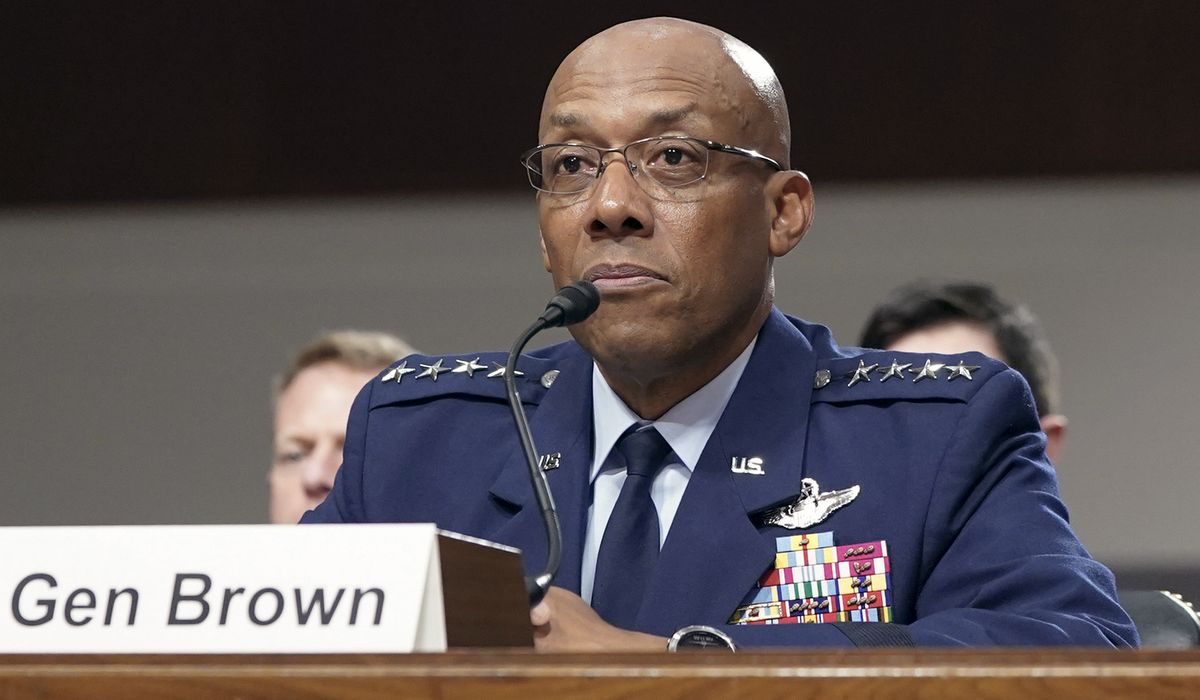The chairman of the joint chiefs has been confirmed by the Senate, while a Republican senator continues to block numerous military nominees.

WASHINGTON — The Senate on Wednesday confirmed Gen. CQ Brown as the next chairman of the Joint Chiefs of Staff, putting him in place to succeed Gen. Mark Milley when he retires at the end of the month.
Brown’s confirmation on a 83-11 vote, months after President Joe Biden nominated him for the post, comes as Democrats try to maneuver around holds placed on hundreds of nominations by Alabama Sen. Tommy Tuberville over the Pentagon‘s abortion policy. The Senate is also expected to confirm Gen. Randy George to be Army Chief of Staff and Gen. Eric Smith as commandant of the U.S. Marine Corps this week.
Tuberville has been blocking the Senate from the routine process of approving military nominations in groups, frustrating Democrats who had said they would not go through the time-consuming process of bringing up individual nominations for a vote. More than 300 nominees are still stalled amid Tuberville‘s blockade, and confirming them one-by-one would take months.
However, on Wednesday, Senate Majority Leader Chuck Schumer, a Democrat from New York, changed his stance and decided to proceed with voting for Brown, George, and Smith.
Schumer stated that Senator Tuberville is compelling them to confront his obstruction directly. He emphasized the need to convey to his Republican counterparts that this situation cannot persist.
Tuberville expressed no opposition to the confirmation votes, stating that he will continue to hold his reservations but is open to considering nominations separately for roll call votes.
John Kirby, the spokesperson for national security at the White House, expressed that the confirmation of Brown, as well as the anticipated votes on Smith and George, is a positive development. However, he emphasized that being in this situation should have been avoided.
Kirby informed reporters that although this decision benefits the three officers mentioned, it does not address the issue or offer a solution for the remaining 316 general and flag officers who are affected by this unreasonable delay.
Brown, a career fighter pilot, was the Air Force’s first Black commander of the Pacific Air Forces and most recently its first Black chief of staff, making him the first African American to lead any of the military branches. His confirmation will also mark the first time the Pentagon’s top two posts were held by African Americans, with Defense Secretary Lloyd Austin as the top civilian leader.
Austin stated on Wednesday evening that Brown would serve as an exceptional leader in his role as the newly appointed chairman.
Brown, 60, replaces Joint Chiefs Chairman Army Gen. Mark Milley, who is retiring after four decades in military service. Milley’s four-year term as chairman ends on Sept. 30.
On Wednesday, Tuberville announced his intention to persist in blocking the remaining nominations until the Pentagon discontinues its practice of funding travel expenses for service members seeking abortions or other reproductive healthcare outside their state. The Biden administration implemented this policy in response to the Supreme Court’s decision to revoke the universal right to abortion, leading some states to impose restrictions or prohibitions on the procedure.
“After Schumer presented the three nominations for a vote, Tuberville suggested either addressing them one by one or reverting back to the previous policy. He emphasized the importance of voting on each nomination individually.”
Democrats had threatened to withhold consideration of the most experienced nominees until Tuberville took action. Senate Armed Services Chairman Jack Reed referenced a military adage in July, emphasizing the importance of not abandoning anyone.
However, during a speech filled with frustration on the Senate floor, Schumer expressed on Wednesday that he had no alternative options remaining.
Schumer accused Senator Tuberville of manipulating the nominees for his own benefit.
The votes come as a host of military officers have spoken out about the damage of the delays for service members. While Tuberville‘s holds are focused on all general and flag officers, they carry career impacts on the military’s younger rising officers. Until each general or admiral is confirmed, it blocks an opportunity for a more junior officer to rise.
It has an impact on salary, retirement benefits, way of life, and future job placements. In certain industries where the private sector offers higher compensation, it becomes increasingly challenging to persuade these skilled and talented young leaders to remain in their current positions.
“I cannot reword”
Tuberville mentioned that he hasn’t had any discussions with Austin regarding the holds since July.
The blockade has frustrated members on both sides of the aisle, and it is still unclear how the larger standoff will be resolved. Schumer did not say if he will put additional nominations on the floor.
In recent days, the prolonged holds have turned into a complex procedural exchange.
Despite the fact that the Pentagon policy remains the same, Tuberville declared triumph following Schumer’s action.
“He informed reporters that we confronted them, and they showed signs of hesitation,” he said about Schumer.
Colleen Long, a writer for the Associated Press, made contributions to this report.

